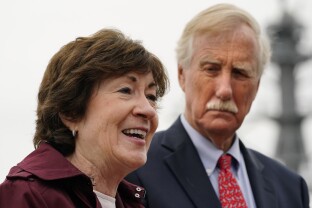Maine Sens. Angus King and Susan Collins are often split on issues — after all, she’s a Republican and he’s an independent who usually votes with Democrats. But on the government funding, they’re on the same page.
King is one of three members of the Democratic Caucus who has voted with Republicans to reopen the government consistently since the shutdown began. They’ve also both urged Agriculture Secretary Brooke Rollins to use contingency funds to keep the Supplemental Nutrition Assistance Program funded during the shutdown — which the administration has said it will not do — and co-sponsored a bill from Sen. Josh Hawley to provide appropriations to the USDA to keep SNAP funded.
King told NOTUS this week that the pair of Maine senators had met to discuss how to end the shutdown, which has now lasted a month, although he declined to share further details.
The way King and Collins are handling the government shutdown mirrors how they handle politics in general: with a heavy independent streak and a rhetorical emphasis on bipartisanship. It’s a stance that plays well in Maine, where 34% of voters are not affiliated with a party, according to the Independent Voter Project.
King “looks for opportunities to demonstrate to his constituents that he is willing to go against the party that he caucuses with,” said Mark Brewer, professor and chair of the Department of Political Science at the University of Maine. “And so I think in this particular situation, that opportunity presented itself, it lined up with where he wanted to vote anyway. So he took that opportunity.”
Brewer said the way King and Collins present themselves is linked to the Maine electorate, which faces some polarization but is “a much more pragmatic electorate than the national electorate as a whole at the moment.”
“He goes to great pains to present himself as an independent, and Collins goes to similar great pains to present herself as someone who is willing to be bipartisan,” he said. “She’s willing to work with Democrats, cross partisan lines on occasion, oppose her own party on occasion. Both of them kind of adopt this, almost a pragmatic type of stance.”
As chair of the Appropriations Committee, Collins plays a key role in government funding talks throughout the year and earlier this month said she was circulating a “discussion draft” on how to reopen the government.
“The path forward is not complicated,” Collins told reporters on Tuesday. “It’s to reopen government and then to agree to bring various (Affordable Care Act) bills to the floor and vote on them — Leader Thune has offered that and I don’t understand why the Democrats aren’t taking ‘yes’ for an answer.”
King said in a statement about a week into the shutdown that he had “been working intensely with senators on both sides of the aisle to find a solution to this problem while at the same time trying get us out of the current increasingly dangerous government shutdown, so far without success. I intend to continue that work and as long as there are Republican senators willing to talk, I’ll be at the table.”
When asked on Thursday how his conversations surrounding the shutdown are going, King said, “I don’t want to comment.”
He has said he broke with Democrats on government funding because he believes a shutdown will give President Donald Trump more power.
King said he hasn’t received any criticism from Democratic colleagues for splitting with them on the shutdown votes.
Sen. Peter Welch, a Democrat from Vermont, went as far as praising King, calling him “terrific.”
“This is a hard call, and you know, he’s a valued member,” Welch said. “I really appreciate his judgment, and we’d be in a better world if we didn’t have shutdowns. So his voice of caution is something all of us take quite seriously, so I have nothing but admiration for him.”
Jim Melcher, a professor of political science at the University of Maine at Farmington, said that having an independent is “something that is part of Maine’s culture,” noting that King served two terms as governor and the state had a different independent governor in the 1970s.
“Political independence and bipartisanship is a piece of Maine politics. In Collins’ case, I think she’s following her party more than anything, but she has always prided on being independent on various things,” Melcher said. “Also, she just voted with the senators from Kentucky and Lisa Murkowski against President Trump’s position on tariffs. So that kind of willingness to buck one’s party is a part of Maine political culture.”
—
This story was produced as part of a partnership between NOTUS, VTDigger and The Maine Monitor.
Sign in
Log into your free account with your email. Don’t have one?
Check your email for a one-time code.
We sent a 4-digit code to . Enter the pin to confirm your account.
New code will be available in 1:00
Let’s try this again.
We encountered an error with the passcode sent to . Please reenter your email.


